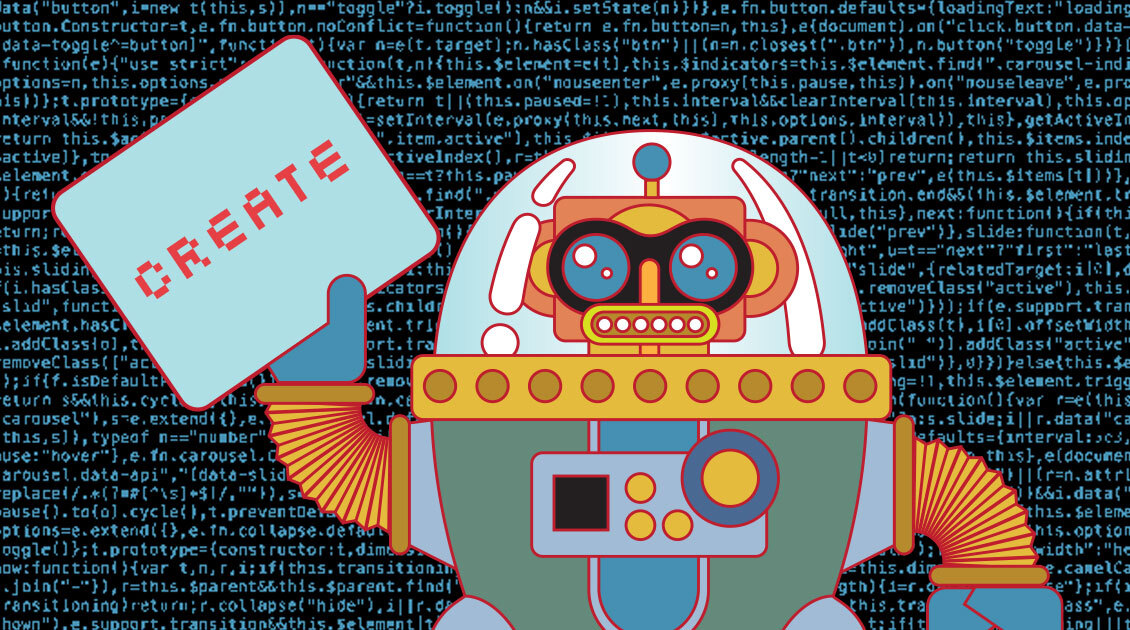
The machines are coming for us. Good thing they still can’t tell a joke.
Every advertising publication today is rife with the ominous rumblings of the havoc to be wreaked on our industry by Big Data. The Krakatoa of analytics has erupted, spewing cheap, quantifiable accountability to the bean-counting drones of the world.
Consumer profiling data means we have never known more about who we are talking to, how they react to our communications and what they do next, than we do now.Suddenly, the Pandora’s Box of ROI has been split open and it’s raining KPIs. Now there are those clients who are crowing in triumph at finally being able to march down the hall and tell their bosses they can finally push their marketing dollars to the bottom line in the name of efficiency. This has pundits and perennial boardroom buzzkillers around the world wagging their fingers at us in the ad industry, with a warning that the days of our expensive creative storytelling are numbered.
Not so fast, Mr. Roboto.
While it is true that the digital revolution has created an unprecedented level of consumer data and this data can be molded, harnessed and leveraged to optimize certain dimensions of marketing, at the same time I would argue there has to be something to optimize.
Something that captures people’s attention. Imagination. Interest. And while data might predict what that might be (from an existing set of choices), it cannot create these choices from scratch.
Because Big Data is driven by two simple, efficient and profitable concepts: measurement and predictability. Big data can measure our behavior and use it to predict what we will do next.
The Zombie Apocalypse is here. (Bad news: We’re the zombies.)
My Spotify chooses music it thinks I will like based on not only my data, but that of millions of others. Amazon guesses what it thinks I will buy next. It’s good business. It’s efficient. Accountable. Quantifiable. And it makes us dumb.
It sucks to be reduced to an algorithm. Because predictable is boring. While they may be able to predict, to a degree, what we’ll listen to or buy, the stuff that makes us interesting is where we don’t stick to the script. This is the paradox Big Data represents for the ad industry.
Data-driven marketing is the equivalent of driving while only using your rear view mirrors. It’s great as long as the road is straight. But life is not interesting unless there’s curves.
Fortunately for us, and I mean for all of us with a heartbeat and a pulse, there is a human element that Big Data will never effectively replicate.
And that is humanity.
The organic nature of our humanity is the one thing that can’t be reduced to an algorithm. Which, my friends, is where we come in. Advertising is at its best when it is interesting. And many times, that is found in the unexpected.
Big Data is not compatible with the unexpected.
No computer could have come up with George Hamilton playing the “Extra Crispy Colonel Sanders.” A bot could not have cooked up “The Most Interesting Man in the World.” No microchip would spit out State Street’s “Fearless Girl” installation. And there’s no way big data would help produce Hormel Pepperoni’s “One Man Band.”
There is a positive side of the digital revolution. Not to reduce us to collective and quantifiable behavioral models, but to unpredictably expose us to the things we would in no other way come across.
There has been a quantum shift in the speed and depth of creation, simply because we have so much more to work with. This is where data has the ability to be the raw ingredients that we can build engaging, inspiring experiences with, instead of simply the funnel they go into, or the yardstick they are measured by.